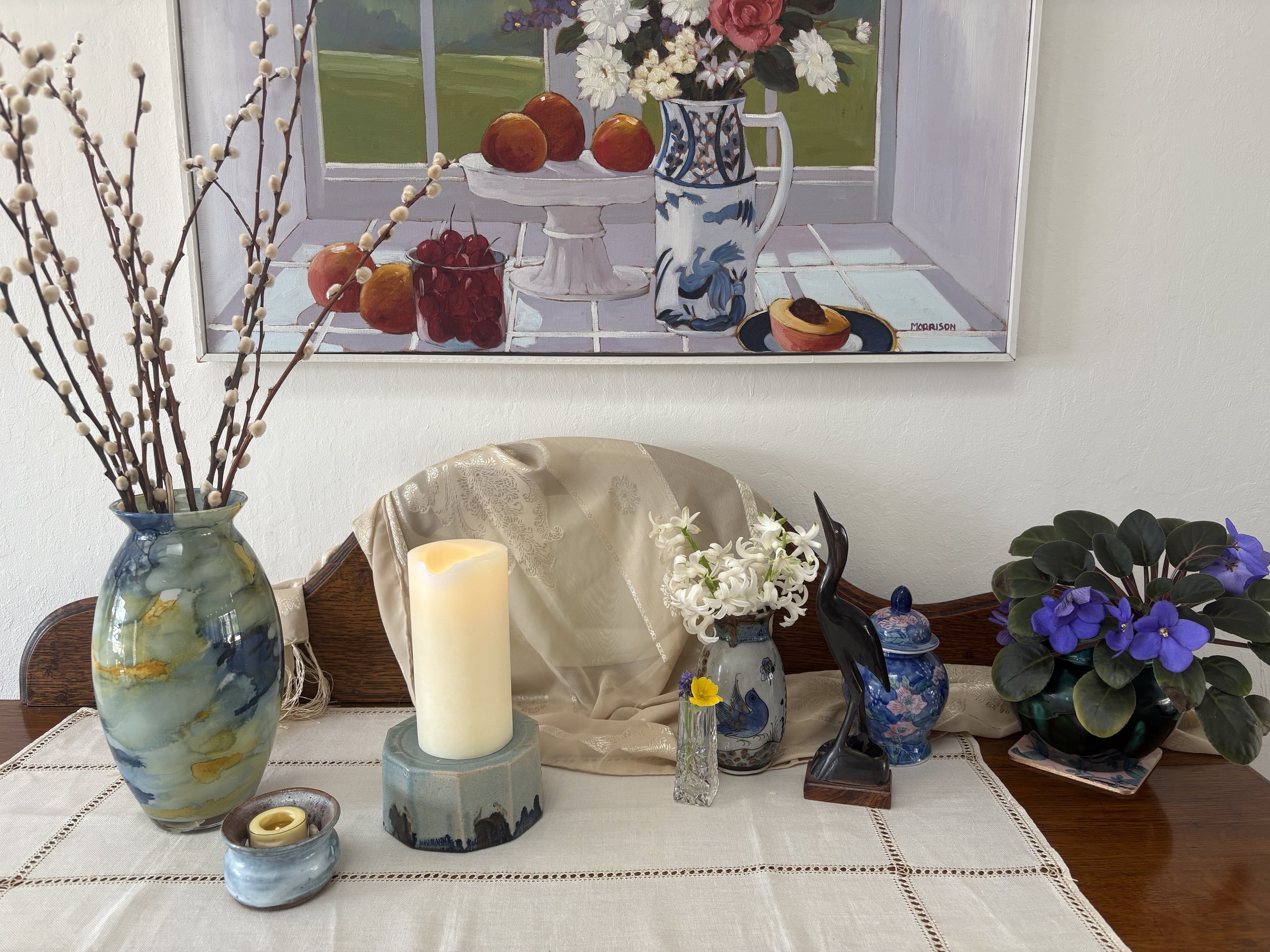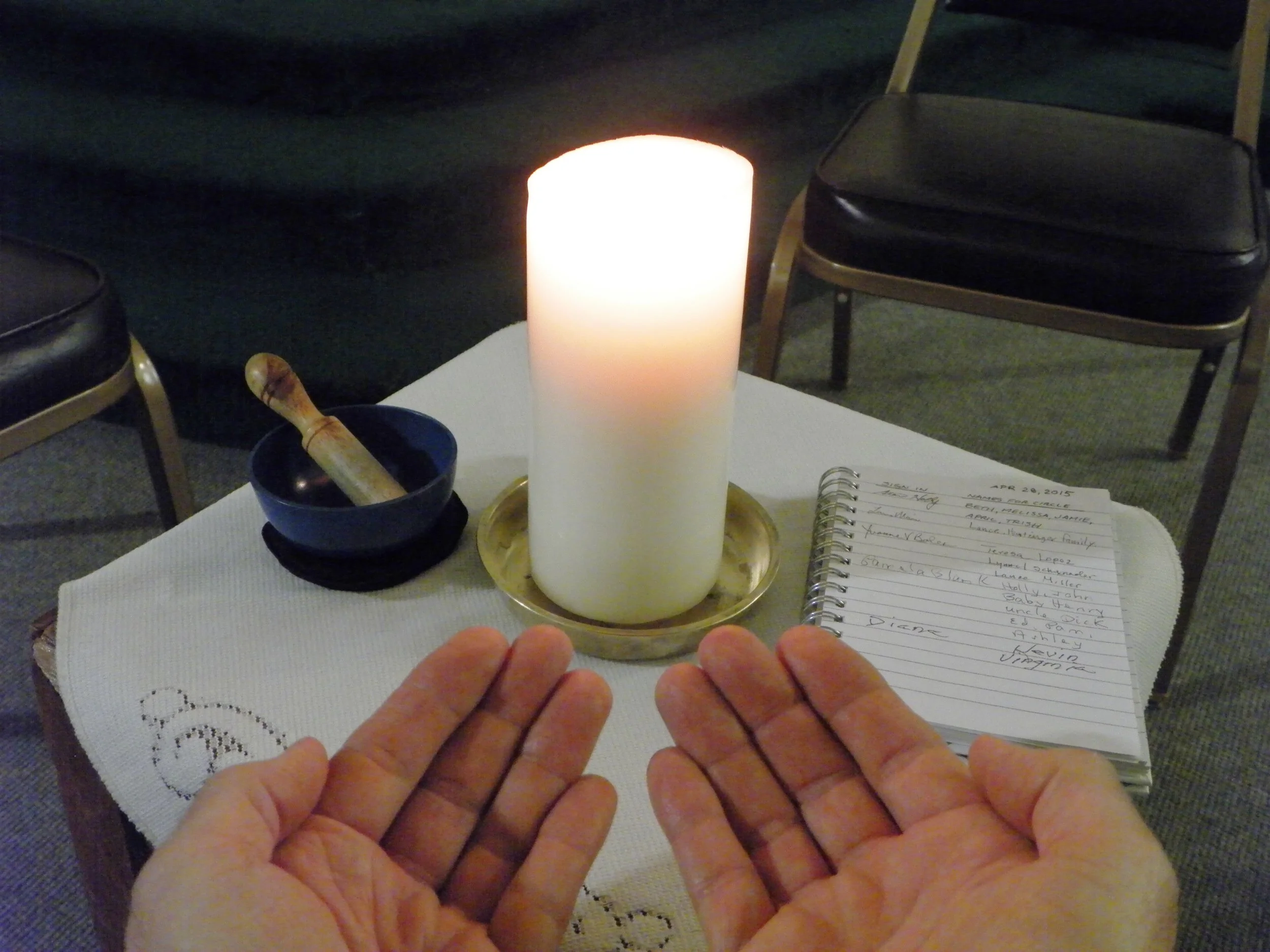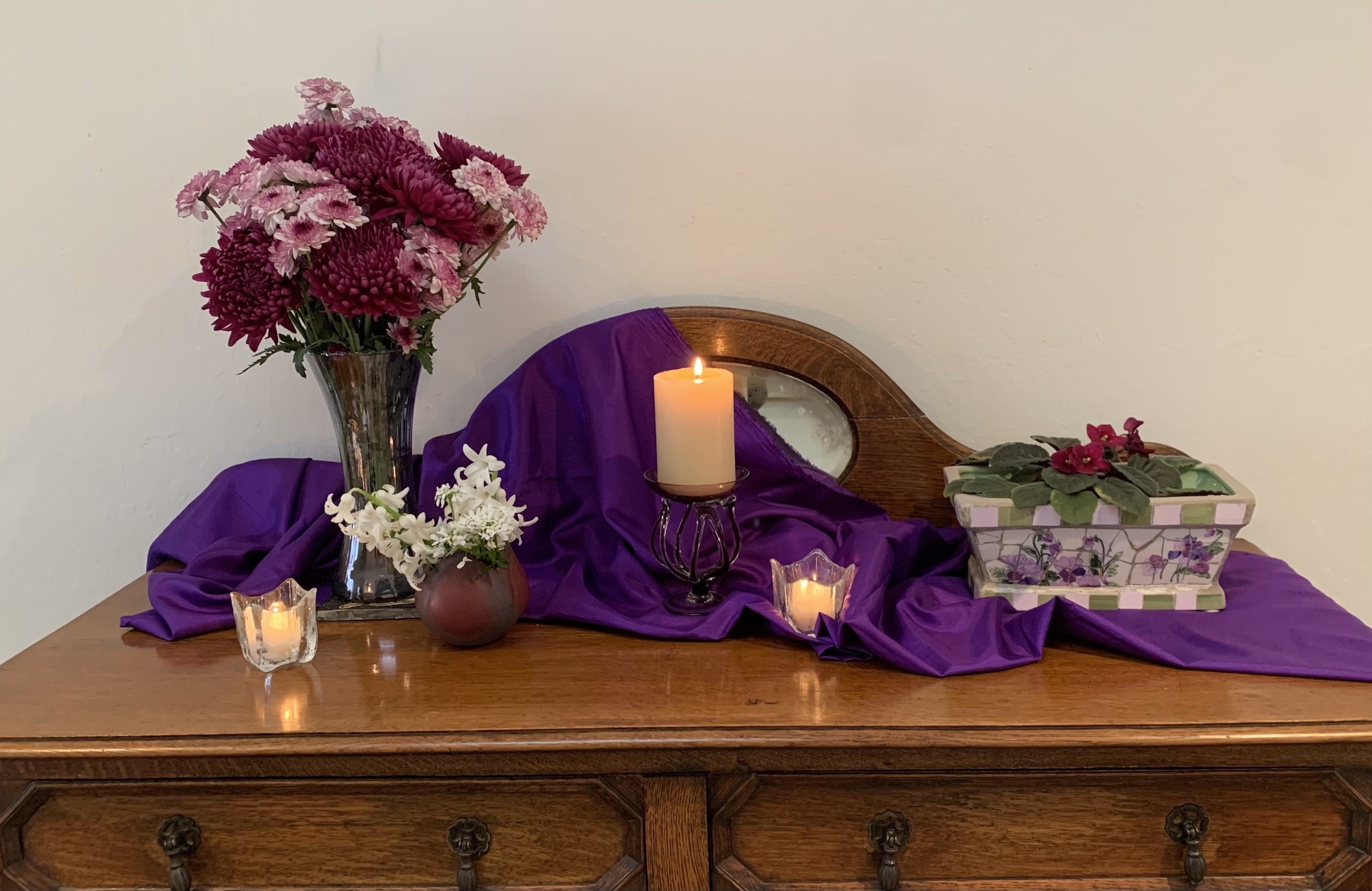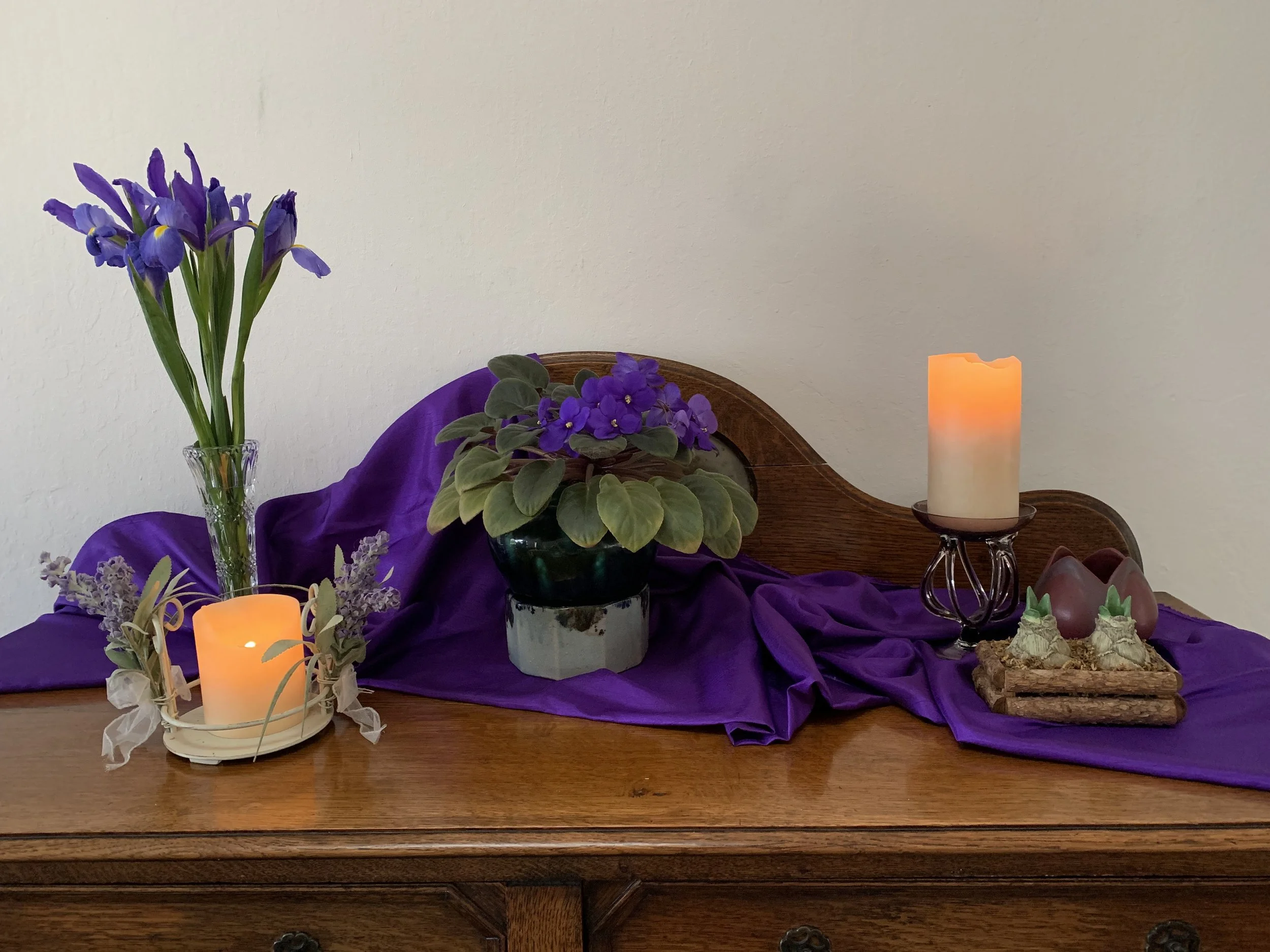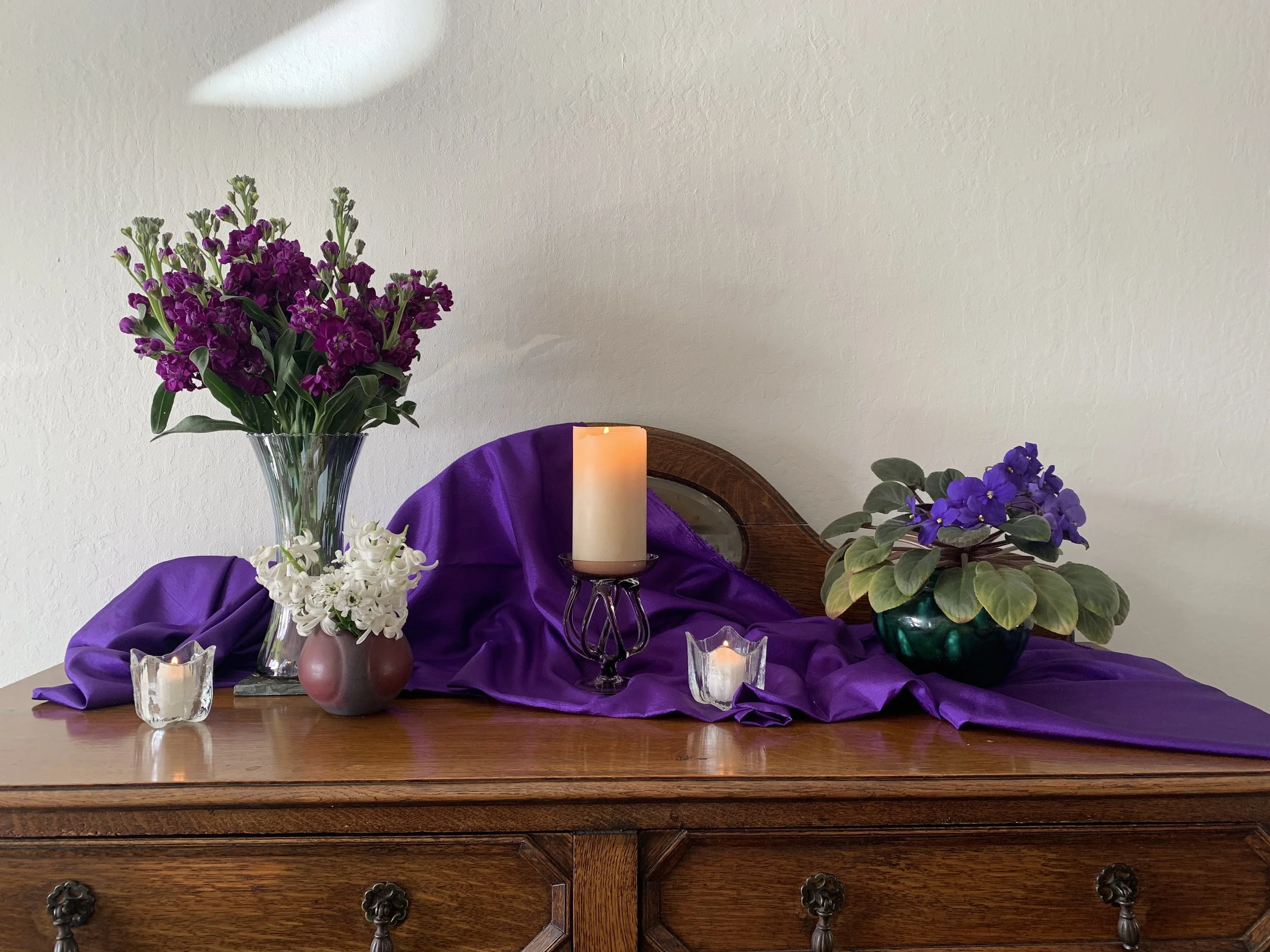Below is a sermon that Rev. Jeanne wrote while ill with pneumonia. Our guest preacher, Jackie, delivered it. It’s subtitled: Embracing The Blessing that Blazes (pur: πῦρ) Among Us, and you can watch or listen to it in its entirety.
Scripture Reading: Acts 2:1-18 What Does This Mean? NRSVUE
When the day of Pentecost had come, they were all together in one place. And suddenly from heaven there came a sound like the rush of a mighty wind (pnoé: πνοή), and it filled the entire house where they were sitting. Divided tongues, as of fire (pur: πῦρ), appeared among them, and a tongue rested on each of them. All of them were filled with the Holy Spirit and began to speak in other languages, as the Spirit gave them ability.
Now there were devout Jews from every nation under heaven living in Jerusalem. And at this sound the crowd gathered and was bewildered, because each one heard them speaking in the native language (glóssa: γλῶσσα), of each. Amazed and astonished, they asked, “Are not all these who are speaking Galileans? And how is it that we hear, each of us, in our own native language? All were amazed and perplexed, saying to one another, “How is this happening? What does this mean?” But others sneered and said, “They are filled with new wine.”
But Peter, standing with the eleven, raised his voice and addressed them, “Men of Judea and all who live in Jerusalem, let this be known to you, and listen to what I say. Indeed, these are not drunk, as you suppose, for it is only nine o’clock in the morning. No, this is what was spoken through the prophet Joel: ‘In the last days it will be, God declares, that I will pour out my Spirit upon all flesh, and your sons and your daughters shall prophesy, and your young men shall see visions, and your old men shall dream dreams… Then everyone who calls on the name of the Lord shall be saved.
Today, as you know, is my birthday, and my ordination anniversary. I love it when they fall on the same day (like they did on my ordination day in 2003 at University Christian Church Disciples of Christ of Berkeley), It was a special day on many, many levels. We processed in behind a bagpiper playing Amazing Grace- a favorite celebratory activity of Disciples who want to honor our Scottish Presbyterian roots. My friends, and mentors read scripture, sang, preached, and danced. There were beautiful altars and banners covered with fiery orange and red dupioni silk fabric. Christy walked beside me holding my hand while it shook. The sanctuary was full. And I made some important commitments and knew when they helped me up off my knees after they prayed me in while the sanctuary was filled with shouts of joy and applause that everything was somehow different. And yes. There were protesters gathered outside who we could hear chanting about how we were all going to hell which made Bill (rest in power my brother) play the organ louder to drown them out.
In a lot of churches this morning, worship will take on the vibe of a birthday party. Pentecost is for many progressive Christian congregations celebrated as “the birthday of the church.” And it also feels like a good excuse to pull out the glitter, and rainbow leis when it falls during Pride month. Pentecost certainly does mark a threshold crossing in the life of the church. It is the beginning of something completely new because it really is time for Koinonia- the Good News - to come out of the closet. The Disciples have followed Jesus’ directions (as far as we can tell since we drop into the middle of the story). They went back home and prayed and waited together- until something weird started happening.
This story has lots of Hollywood style effects. It has wind (pnoé: πνοή, ῆς, ἡ) which is ironically the root of our word pneuma (pneumonia), fire (pur: πῦρ, πυρός) which is at the root of our word purify, and spiritual phenomena (tongues of fire) that included miraculous bewilderment because they could understand each other even though they spoke different languages and dialects (glóssa: γλῶσσα). We can feel Luke struggling to find the words for things beyond explanation and in the realm of divine mystery in this passage. He’s definitely as the Rev. Dr. Wilda Gafney describes it “hammering nails with the butt end of a screwdriver” as he tries to describe what is going on. And this kind of hammering around the imagery of Acts 2 didn’t stop in the 1st Century. Our most gifted poets are still trying to make sense of the strange imagery of Pentecost.
Hear a word from T.S. Eliot in “The Four Quartets”
“The dove descending breaks the air
With flame of incandescent terror
Of which the tongues declare
The one discharge from sin and error.
The only hope, or else despair
Lies in the choice of pyre or pyre—
To be redeemed from fire by fire.”
And more recently Mary Oliver writes, “Can one be passionate about the just, the ideal, the sublime, and the holy, and yet commit to no labor in its cause? I don’t think so. All summations have a beginning. All effect has a Story. All kindness begins with the sown seed. Thought buds toward radiance. The gospel of light is the crossroads of —indolence, or action. Be ignited or be gone.”
Luke keeps telling us that everybody in Acts 2 was “bewildered” and “amazed and astonished” and “perplexed” Perplexed (diaporeó) in Greek, according to Strong’s means there is “no way out, or no way to solve the puzzle.” Encountering the power and movement of the divine directly can be very confusing, overwhelming, and scary. There is really no way to solve the puzzle but to surrender. The Scriptures tell us that an experience like that might even make your hair and face turn white like Moses when he came down from Sinai. Or it might cause one like Peter to start babbling about building shelters for the prophets that have shown up in spirit with Jesus as he has mysteriously started glowing during the transfiguration. Encountering the divine mystery here in Acts 2 causes Luke to start writing about divided tongues of fire, and mighty rushing wind. He’s struggling to work out a puzzle there is not a solution for. As Rev. Nadia Bolz Weber astutely reminds us, “the Gospel is not domesticatable enough for the mind to grasp. It’s wilder than that. Like wind. It’s more beautiful and a-rational than reason alone can contain.”
Rather than get stuck trying to explain the fire, the tongues, the wind, and the mystery, I want to invite us to notice a couple of really important things that are going on in this passage. Henri Nouwen suggests that the unique thing about Pentecost is that “The Spirit of Jesus comes to dwell within us, so we can become living Christs in the here and now.” This tongues, wind and fire Pentecost event is rooted in divine timing (Jesus told them to wait- Now the time has come). And the timing is rooted in the most powerful of places- the present moment. In order to give birth to a new iteration of church, whether we are in the first century or the 21st, we are called to embody the fully divine, and fully human mysterious a-rational Holy Spirit of the risen Christ in the present moment. We are called to listen, speak, use our voices, seek justice, transform ourselves with the help of God, and get our hands dirty. And we never quite know how we’ll be called to do that. There’s a lot of mystery there too- in the journey, in the wisdom of other tongues, and in encountering the divine in the twists and turns where we didn’t intend to find it. As Suzy Kassem puts it, “I am hearing wisdom from tongues I did not intend to listen to. I am encountering beauty where I did not want to look for it. And I am learning so much from journeys I did not want to take.”
Another thing I want to call your attention to is that Jesus taught and lived and modeled the journey we are called to embrace. At its core that journey is deeply relational. It’s about loving and being in relationship with God- loving God with heart, soul, mind, and strength, and loving our neighbors as ourselves.
It is about being peacemakers and being compassionate and as Jesus puts it-doing things for the least of these because when you do it for them, you are doing it for me (Matthew 25). This Pentecost experience is not a private in the closet prayer experience. It is not rooted in pull yourself up by your bootstraps rugged individualism. It is not a call to “protect our own” like one white Christian nationalist leader stated recently. A personal relationship with Jesus is not enough. Instead, this very loud, very disruptive, very public outing of the Holy Spirit is rooted in the experience and power of being rooted in the diverse, complicated and ever evolving beloved community.
Jan Richardson captures this beloved community power in her Pentecost Blessing when she writes,
“This is the blessing
we cannot speak
by ourselves.
This is the blessing
we cannot summon
by our own devices,
cannot shape
to our purpose,
cannot bend
to our will.
This is the blessing
that comes
when we leave behind
our aloneness
when we gather
together
when we turn
toward one another.
This is the blessing
that blazes among us
when we speak
the tongues
strange to our ears
when we finally listen
into the chaos
when we breathe together
at last.”
We cannot navigate the journey alone. We have to gather together. We have to turn toward one another. We have to leave behind our aloneness, even when we are terrified, and listen into the chaos and breathe together at last. That is why the miracle of speaking in other tongues in Acts 2 is so incredible. It’s about understanding and listening and hearing across differences. It is about the DEI infused power of the Holy Spirit and the work we embody in the beloved community in the present moment. Right now friends we are drowning in chaos. It is hard to know what is true and what isn’t. The news is stressful and taxing and terrible. And yet I believe that the 2nd Chapter of Acts calls us to listen into the chaos together so we can discern our way forward together. We need each other- no matter what tongue we speak, or hear as we struggle to know how to give birth to the gospel and love our neighbors in the 21st Century.







